1110 Search Results for Core
December 5, 2013
by Robin Parker -
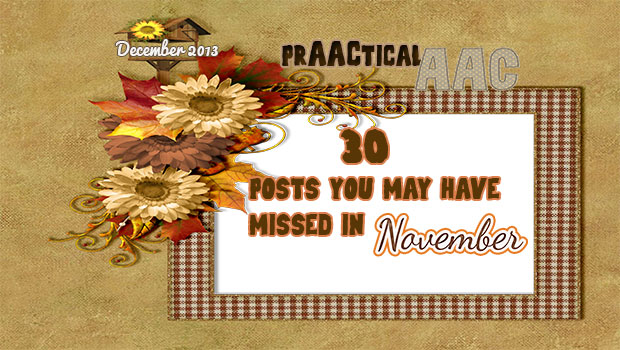
Strategy of the Month Thoughts on Teaching Core Vocabulary Teaching Core Vocabulary with Direct Instruction Strategies New Word Teaching: A Look Inside Some PrAACtical Therapy Sessions Core Words, Direct Vocabulary Instruction, & the Beginning Communicator PrAActical Thinking Fun Friday- 5 Tips for Talking About Halloween After it is Over 31 Posts You May Have Missed in October A PrAACtical Literacy Activity for Beginning Communicators Writing Goals for AAC Learners Fun Friday: Holiday Shopping with a Purpose 10 Apps to Gift to An SLP Hockey Lessons Watch it Wednesday: Using Routines to Promote Interactions by the Watson Institute Throwback Thursday: Say This, Not That to Reinforce Vocabulary Learning Fast FAACt Friday: AAC’s 1st Appearance in the Professional Literature How Do You Teach Others to Implement AAC Facilitation Skills? Watch it Wednesday: Time Timers At the Very Beginning: Working with Pre-Intentional Communicators Display Stand for Visual Supports or Books PrAACtical Thoughts on... [Read More...]
December 2, 2013
by Robin Parker -
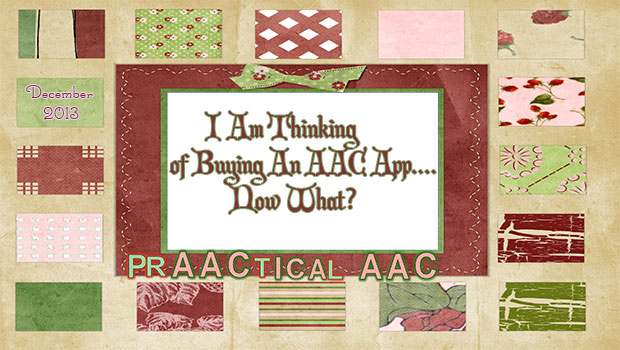
This may be the time of year you are thinking of adding AAC apps to your assessment collection or are planning on getting one for an individual learner or for a group of learners. As you consider which app or apps to purchase, here are some feature considerations as well as some options for learning about the apps. **For any individual learner, a specific AAC evaluation by a qualified speech-language pathologist is always highly recommended. Language Features Core word approach to language learning Functional language approach to language learning Visual scene approach to language learning Pre-made communication displays or create your own Communication Functions (requesting, Choicemaking, commenting, complaining, etc.) Sentence building options Options for morphological learning Allows for full communication including requests, saying no, greetings,ventings, and sharing of information Comprehensive language learning Small Talk Single or sequenced messages Technical Features Customization level Platform Options (iOS, Android, Computer) Digitized (recorded) vs... [Read More...]
November 23, 2013
by Carole Zangari -
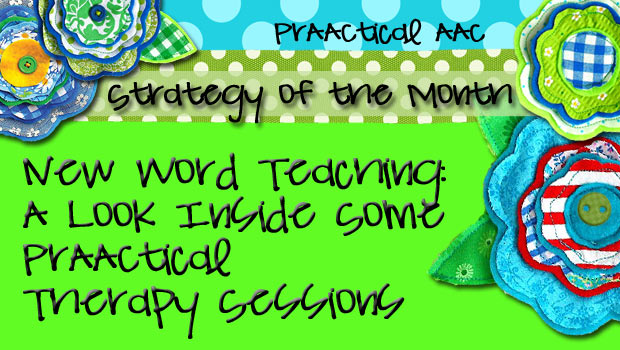
Since we’ve been talking about vocabulary instruction, we thought it might be fun to take a peek inside some therapy sessions where new words were being taught. In the examples below, we were teaching a core word and a Tier 2 vocabulary word over a few sessions. Here are some excerpts with their key intervention principles and practices. Target Words: do/did as an auxiliary (not main) verb Activities: Introduced a Visual Support (anchor chart): This explained the concept of ‘Helping Verbs,’ provided information on how they are used, listed them, and provided examples. These are effective tools for initial teaching, but are also invaluable for ongoing instruction. We use them extensively in language therapy, referring back to them often when we want to reinforce correct responses (look back at the visual together to further solidify the concept), help ‘fix’ incorrect responses (reteaching the pieces that didn’t stick), and facilitate self-correction... [Read More...]
November 11, 2013
by Robin Parker -
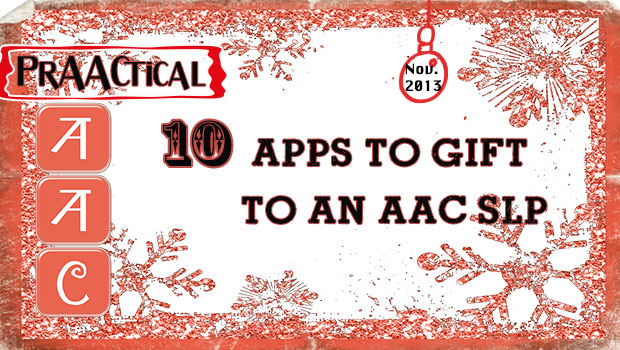
It’s definitely time to think about the holidays because they are almost here. Apps are often a great gift for your colleagues or for the SLP working with your child. Here are just a few suggestions that will help the SLP. Please feel free to share others you think should be added to this list. Evaluation Genie – This app is an informal assessment tool that helps with identifying skill areas that relate specifically to the language representation methods commonly found on augmentative communication systems. There are 14 subtests that help with identifying the features for an AAC device that a student would need. The student responses are recorded and easily reportable. ATEval2Go – designed helps guide you through a template for technology considerations so that the SLP can document observations and information in a structured manner. All the documentation can then generate an editable usable report. Additionally, a goal bank can be... [Read More...]
November 6, 2013
by Carole Zangari -
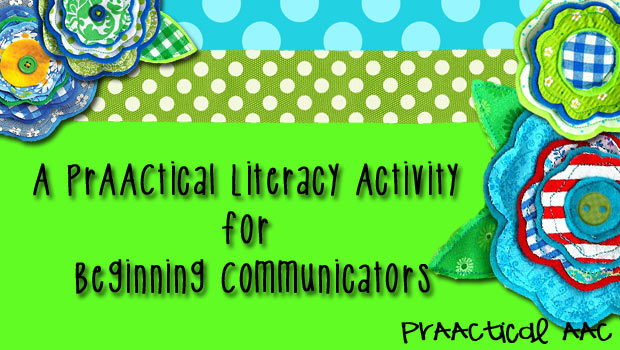
We’ve been having a great time supporting beginning communicators and gently modeling how they can be involved in literacy learning activities. In this post, we share a super simple activity to build alphabet knowledge and letter-sound correspondence. It has worked well (or fairly well) for beginning communicators who: Are just learning to establish cause-effect relationships Have little interest in existing classroom alphabet activities Are verbal, but reluctantly Are reluctant participants in group activities and seem to prefer being alone Have no formal AAC system, but would benefit from one Treat books and other printed materials as objects to spin, rip, or throw Have not been given the opportunity to participate in traditional literacy instruction. We love it because: It is is quick and easy. It requires almost no advance planning other than having a camera (or one on your phone/mobile device) Other people in the classroom notice us doing real... [Read More...]
November 4, 2013
by Robin Parker -
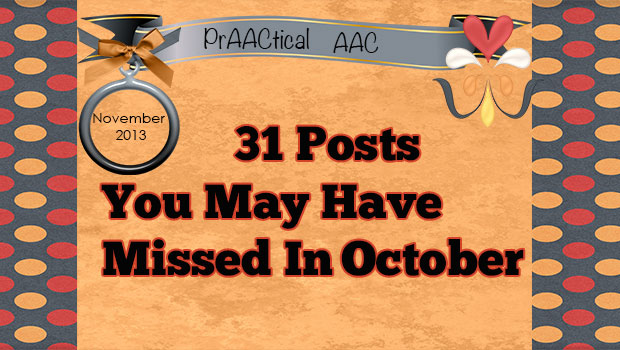
Strategy of the Month Building Participation Building Participation with Older Learners Classroom Participation Community Participation PrAACtical Thinking Second Annual AAC Awareness Month Celebration! 5 Fun AAC Things to do to Get Ready for Halloween 30 Posts You May Have Missed in September Celebrate AAC Awareness Month with PrAACtical Giveaways Another PrAACtical Celebration How Can we Make ‘Clients’ ‘like’ Using their AAC ? 6 Things to Learn from Talking AAC Communicative Competence in AAC Throwback Thursday Core Word Round Up Celebrating AAC Awareness Month 2013 Halloween Recipes for Cooking AAC Style Fast FAACt- What 24 Cents Will Buy Perception & Presuming Competence 5 Ways to Promote Consistent AAC Use What Went Well How I Do It Implementing AIded Language Input with Alicia Garcia 5 AAC Things I Wish I Had Known with Deanne Shoyer Teach Me Tuesdays Alexicom AAC Proloquo2Go Video of the Week Everyone Communicates- Advocacy & Inclusion Developing Communicative Competence... [Read More...]
November 1, 2013
by Robin Parker -
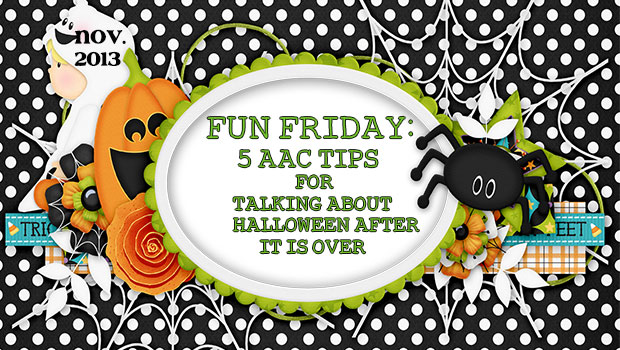
Language learning involves talking about events in the past, present, and future. Since Halloween is over, it is a perfect opportunity to help AAC users talk about past events. Here are 5 tips for getting started with ALL learners. Use a weekly or monthly (calendar) schedule to ‘remember’ Halloween or if you are sticking to core words to remember the “great day” or “bad day” depending upon the experience. Use photos of the Halloween festivities to discuss what happened, what everyone did, and you could even go for the best and/or worst part of the day. Use a Venn diagram to compare and contrast Halloween experiences. This can be done with comparing 2 people or 2 groups. For some learners, you can use images to put Halloween things that everyone saw or did while others you will need text only. Then, a discussion of what each student/group did that... [Read More...]
October 31, 2013
by Robin Parker -
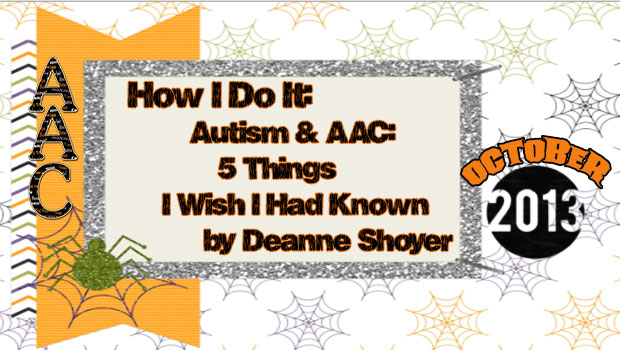
We are so pleased to have connected with Deanne Shoyer from Small But Kinda Mighty and even happier that she is our guest blogger today. Deanne is a mom of twin boys who both are on the autism spectrum. Deanne successfully fundraised to buy iPads for her boys and has been active for more than 3 years in social media and in the special needs app community. She has written about many things but often focuses on implementing AAC in a very PrAACtical way. Please feel free to share this very important post as she highlights AAC, what she has learned, and how it may help others. by Deanne Shoyer at Small But Kinda Mighty (original post at Small But Kinda Mighty) In the title of this post I’ve linked autism and AAC for a specific reason. A lot of the points here are equally applicable to people who have a... [Read More...]
October 26, 2013
by Robin Parker -
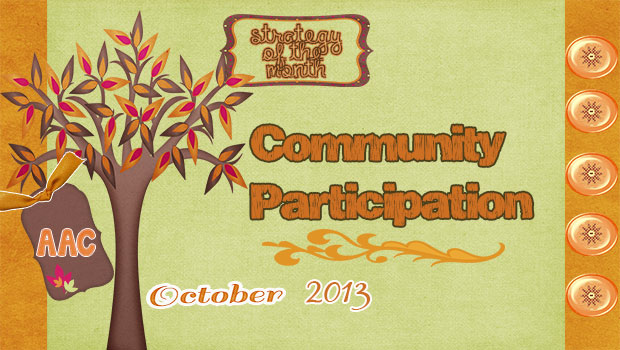
Community participation and communication for AAC users is an integral part of of developing, growing up, and having inclusive opportunities. We often relate community participation to quality of life indicators. Community participation for AAC users begins from the… beginning. Young children can order in restaurants, use picture menus, and have access to many inclusive events. As children grow into adolescents and adults, community participation involves post secondary options, employment, and community living. Perspectives from AAC Users Have communication displays and devices available at ALL times– You need access to a communication system(s) to participate in all situations. Remember to take AAC with you. The sooner the AAC user becomes responsible for taking or telling someone to take the device/displays with them the easier it becomes. For mobile technology systems, there are rugged cases that withstand wind, water, even medical waste (see Lauren Enders Pinterest boards for case and accessory options).... [Read More...]
October 24, 2013
by Robin Parker -

Cooking is a great activity as the platform for meaningful language experiences for both children and adults. Halloween often involves candy and tasty treats. However, there are also plenty of healthy Halloween foods (e.g., carrot pumpkins, tangerine & celery pumpkins, or apple teeth to name just a few). Then comes Thanksgiving and all the recipes that go along with it (e.g., lots of opportunity for repetition with variety). Everyone can be involved with cooking, although just because you cook doesn’t mean you need a stove. From spooky chex mix to more elaborate cookie and cake decorations, there is a ton of active participation and conversation that can be incorporated into cooking. And the fun and rewards (eating) are built-in. Although there are plenty of Halloween recipes, many recipes can be turned ‘spooky’ with an addition/modification of Halloween shapes or colors. You can cook using core words and/or focusing on the... [Read More...]









